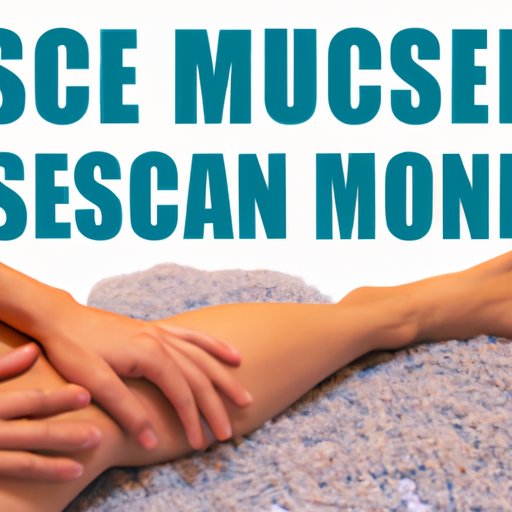
Introduction
Have you ever woken up with sore and stiff muscles after a workout or a long day of physical activity? Sore muscles can make it difficult to move and carry out your daily tasks. Unfortunately, muscle soreness is a common result of intense exercise, physical labor, or even prolonged sitting. In this article, we will discuss some fast and effective ways to get rid of sore muscles overnight and wake up feeling ready to take on the day.
RICE method
The RICE method stands for Rest, Ice, Compression, and Elevation. This method has been shown to be effective in reducing muscle soreness by speeding up the recovery process. To apply the RICE method, you need to:
- Rest: Avoid any activities that strain the affected muscle. Give your body time to heal and recover.
- Ice: Apply ice to the sore area for 15-20 minutes every hour. This helps to reduce inflammation and pain.
- Compression: Wrap the affected area with an elastic bandage to reduce swelling and provide support to the muscle.
- Elevation: Raise the affected area above the heart level to reduce swelling and improve blood circulation.
Stretching exercises
Stretching can improve muscle flexibility, prevent injury, and alleviate soreness. Here are some stretching exercises that can help:
- Static stretching: Hold a stretch for 30-60 seconds without moving or bouncing. Examples include hamstrings, quads, and calves.
- Dynamic stretching: Incorporate movement into the stretch, such as leg swings, arm circles, or lunges.
- PNF stretching: Also known as proprioceptive neuromuscular facilitation, this type of stretching involves contracting and relaxing the muscle while stretching it further. This method is best done with a partner or a trainer.
Heat therapy
Applying heat to sore muscles can help to reduce pain and stiffness. Here are some ways to apply heat:
- Hot water bottle: Fill a hot water bottle with warm water and place it on the sore muscle for 15-20 minutes.
- Warm bath: Soak in a warm bath with Epsom salts for 20-30 minutes. Epsom salts contain magnesium, which can help to reduce inflammation and relax muscles.
- Heating pad: Use a heating pad on a low setting to apply heat to the affected area. Do not leave the heating pad on for more than 20 minutes.
Massage therapy
A massage can improve blood circulation, reduce muscle tension, and alleviate soreness. Here are some massage techniques you can try:
- Self-massage: Use your fingers, palms, or a foam roller to massage the affected area. Apply pressure for 30-60 seconds, then release.
- Deep tissue massage: This type of massage targets the deeper layers of muscle tissue. It is best done by a professional massage therapist.
- Trigger point massage: This massage targets specific areas of muscle tension or knots. Apply pressure to the affected area until the tension releases.
Hydration
Staying hydrated is important for muscle recovery. Water helps to flush out toxins, transport nutrients to muscles, and prevent cramps. Aim to drink at least 8-10 glasses of water a day, and more if you are physically active or in a hot environment.
Natural remedies
There are a few natural remedies that may provide relief for muscle soreness:
- Epsom salt bath: Soak in a warm bath with Epsom salts for 20-30 minutes. Epsom salts contain magnesium, which can help to reduce inflammation and relax muscles.
- Essential oils: Peppermint, eucalyptus, and lavender oils have anti-inflammatory and pain-relieving properties. Mix a few drops with a carrier oil and massage into the affected area.
- Herbal supplements: Turmeric, ginger, and omega-3 supplements may help to reduce inflammation and promote muscle recovery.
Get a good night’s sleep
A good night’s sleep is essential for muscle recovery. During sleep, the body repairs muscles, reduces inflammation, and restores energy levels. Here are some tips for getting a good night’s sleep:
- Stick to a routine: Go to bed and wake up at the same time every day to regulate your body’s natural sleep-wake cycle.
- Create a sleep-conducive environment: Use comfortable pillows and blankets, minimize noise and light, and keep the room cool.
- Avoid caffeine and alcohol: Caffeine and alcohol can disrupt sleep and prevent you from getting enough deep sleep.
Conclusion
Sore muscles can be uncomfortable and limit your movement. Fortunately, there are many ways to alleviate muscle soreness overnight. Try applying the RICE method, doing stretching exercises, using heat therapy, getting a massage, staying hydrated, using natural remedies, and getting a good night’s sleep. By combining these methods, you can help your muscles recover faster and wake up feeling refreshed and ready to start your day.




